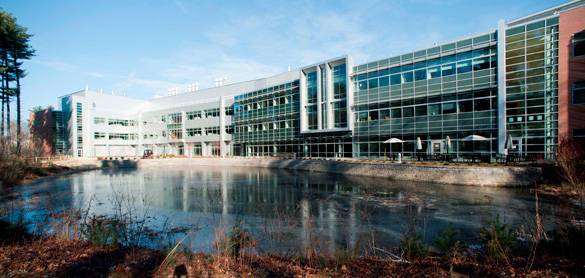Life sciences companies are increasingly going the green route, both in new construction and in renovations. Two recent examples are EMD Serono and BD.
EMD Serono, part of the Germany-based Merck Group, has opened a $65-million, 140,000-sq.-ft. (13,000-sq.-m.) research center in Billerica, Mass. The new facility is one of four research & development hubs within Merck Serono. The other centers are located in Germany, Switzerland and China. The Billerica center, which will specialize in research in oncology, neurodegenerative diseases and infertility, will add 100 jobs.
EMD Serono is working toward LEED-Gold certification at this facility within the following categories: indoor environment quality, sustainable sites, water efficiency, energy and atmosphere, and materials and resources. The project’s construction manager was Jones Lang LaSalle.
“This research expansion represents EMD Serono’s clear purpose of scientific and medical innovation, and solidifies the company’s presence in Massachusetts as a leading, global organization in the life sciences industry,” said Fereydoun Firouz, president and CEO of EMD Serono. “We are focused on retaining and attracting the best scientists to develop therapies that provide value and breakthrough solutions to people living with serious medical conditions such as fertility disorders, cancer and neurodegenerative diseases.”
The company says the site’s proximity to Boston (20 miles, or 32 km., northwest) will help with existing networks and scientific collaborations, which include academic institutions, research organizations, hospitals and healthcare institutions.
The new site will be home to approximately 200 scientists with expertise in cancer biology, cancer immunotherapy, oncogene signaling, medicinal chemistry, molecular modeling, protein engineering, therapeutic antibodies and manufacturing cell lines across the core therapeutic areas of neurodegenerative diseases, cancer and infertility.
One of Many for BD
BD Diagnostics’ Women’s Health and Cancer facility in Mebane, N.C., has received Silver LEED certification. The Mebane facility is among four LEED-certified BD locations, with 11 additional BD sites worldwide currently pending certification.
“BD is committed to being a responsible corporate citizen here in Alamance County as well in our global community,” said Wayne Brinster, vice president and general manager, BD Diagnostics – Women’s Health and Cancer. “This LEED Silver certification represents BD’s commitment to reducing the environmental impact of our overall building imprint and to becoming the most environmentally responsible company in the medical technology industry.”
The 101,000-sq.-ft. (9,382-sq.-m.) building opened in May 2010 after being reengineered and refurbished. Overall, the building is projected per year to use 25 percent less energy and 83,000 fewer gallons of water than a comparable building in Alamance County. More than 95 percent — 352 tons — of the construction materials used during the $14-million project was recycled and diverted from landfills. Nearly 30 percent of the materials used in construction and furnishings were previously recycled, and 40 percent were manufactured regionally.
BD’s Mebane facility achieved points towards LEED-Silver certification for pollution control and diversion during construction, energy efficiency (mechanical and lighting), occupant comfort, ergonomics, green housekeeping, water use reduction (with landscaping and automatic restrooms), storage and collection of recyclables, indoor air quality and low-emitting materials (paints, coatings and carpet systems). No chlorofluorocarbon-based refrigerants are used in the heating, ventilation and air conditioning system.
Other highlights of the tobacco-free BD Diagnostics facility include office furniture made from recycled-content wood, recycled plastics and recycled scrap metal. Countertops in the front lobby and employee break room are constructed of shredded aluminum cans, while plates and utensils used on site are made from sustainable materials such as corn starch, sugar cane and plant starch. All carpeting is made of fiber from recycled plastic bottles, with laboratory flooring made from recycled vinyl with cork, which provides increased traction when wet. Cleaning supplies used in the facility are USGBC-approved green products.
